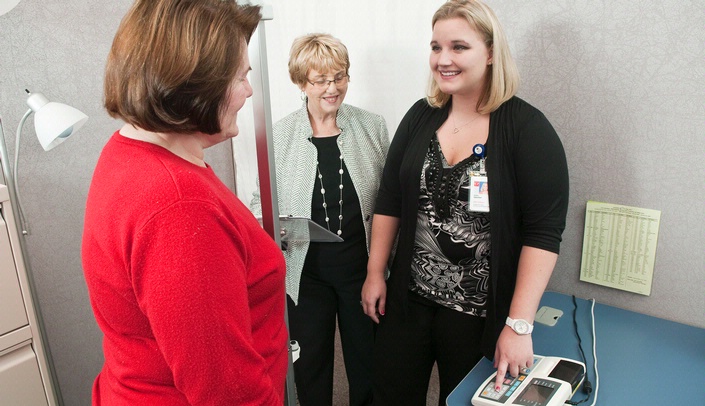We all know we can improve our health by eating better and being more active. Still, scientists had to prove it. And, they have.
But the mystery remains, how do we eat better and be more active, and stick with it? Thankfully, scientists are working on that, too.
That’s what UNMC’s “rural women” clinical trials are all about.
And the researchers of UNMC’s “rural women” community-based clinical trials were using an interprofessional team to do it, long before being interprofessional was the thing to do.
“We didn’t even realize that we were on the cutting edge,” Patricia Hageman, Ph.D., said with a laugh.
It’s true. Carol Pullen, Ed.D., professor in the College of Nursing, and the studies’ principal investigator, is a nurse. Dr. Hageman, Karen Linder Professor for Women’s Health in the College of Allied Health Professions, is a physical therapist. Linda Boeckner, Ph.D., a University of Nebraska-Lincoln professor, is a medical nutritionist and extension educator.
And the clinical trials – one version or another of which has been funded continuously since 2001 – have shown the merits of interprofessional collaboration. They’ve shown that using distance technology delivery will work, even in rural areas – especially in rural areas (the studies have reached women in more than 35 Nebraska counties).
“For a while, we had a tough time convincing the NIH (National Institutes of Health) reviewers that rural women would use technology,” Dr. Pullen said.
The projects have shown that, with counseling, people can make significant changes in their health outcomes with lifestyle changes.
And, turns out, many of the women studied did stick with it. In the recently concluded Wellness for Women: DASHing towards Health study, the attrition rate, “was unreal, it was so low,” Dr. Pullen said. At a gathering at the conclusion of the study, several women asked to keep it going.
The grassroots, interprofessional nature of the program helped. Counseling sessions, followed by phone goal-setting sessions and 16 tailored “newsletters,” either web-based or by mail, helped study participants keep on track. And in a year, almost half of the participants had lowered their blood pressure to normotensive status.
The team is currently finishing the 30-month Women Weigh-in for Wellness study, using web-based delivery to help women lose weight and maintain weight loss. Preliminary findings suggest Internet-based technology has helped rural women who do not always have access to prevention programs in their communities.
